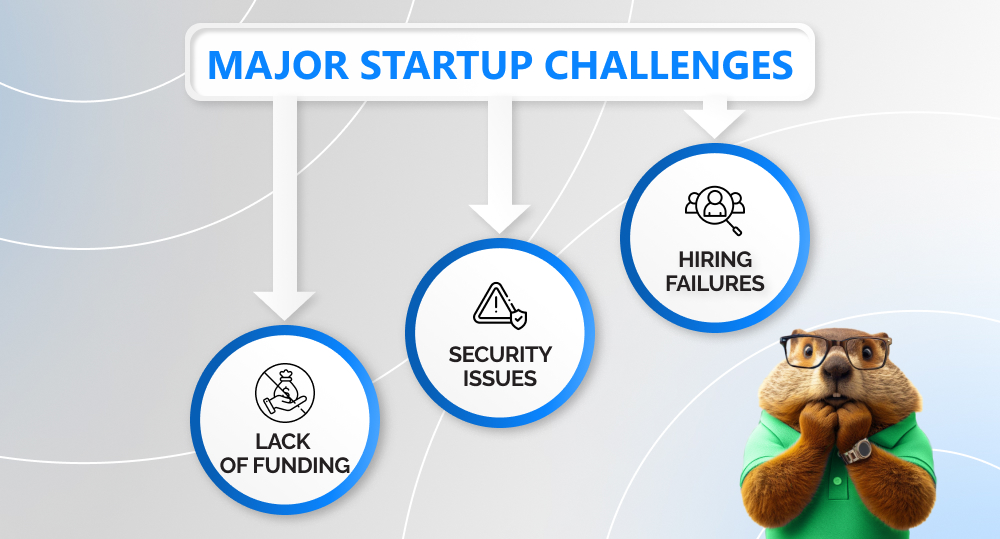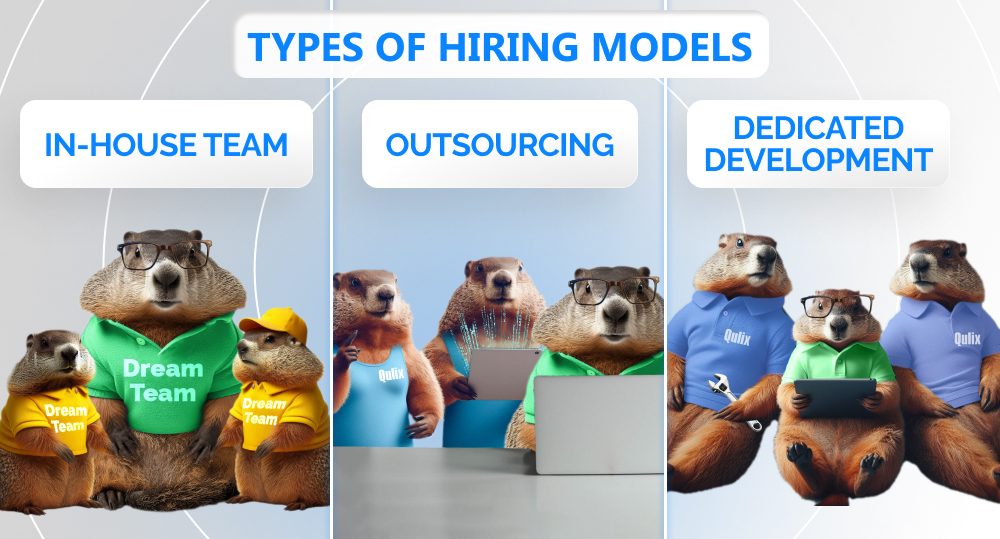“How to find developers for a startup and stay within the budget?” This question inevitably haunts those who are planning to set up their own company. And that's a good sign since when it comes to business processes, people do matter. In fact, it is not that essential to be a tech genius or a professional accountant to get started and excel, but rather have cool hiring strategies in your armory and be able to delegate duties.
If you are not a brilliant recruiter, don't rush into panic. In this article, we will share our expert hiring tips and tell you how to find developers for your startup.
written by:
Sergey Pupkevich
Head of Java Solutions
“How to find developers for a startup and stay within the budget?” This question inevitably haunts those who are planning to set up their own company. And that's a good sign since when it comes to business processes, people do matter. In fact, it is not that essential to be a tech genius or a professional accountant to get started and excel, but rather have cool hiring strategies in your armory and be able to delegate duties.
Contents
Step#1. Get Ready for the Game
Have you heard that it is possible to start a business in the USA within 6 days? Pretty impressive, huh? However, despite favorable economic and legal conditions, 20% of such early-stage startups fail during the first year. The reason for such an outcome is as clear as a day: fierce competition and unexpected challenges. To avoid this slippery slope of disappointed ambitions and save money and nerves, startup owners should know the risks by sight at the beginning of the business journey.
Lack of Funding
We won't lie to you: attracting the proper amount of resources for a startup project is no mean feat. Even if you've managed to get seed capital, don't just sit back and wait for new revenue streams to flow directly into your pocket. When allocating the project budget, keep in mind, that it may take several months until the first clients heave in sight or the product gets released. But don't let these words scare you off: with several capital-raising strategies in your pocket, you will overcome the challenge and stay afloat. Just elaborate them in advance to avoid hasty decisions in case of emergencies.
Security Issues
With 2,200 cyberattacks happening every day, it's worth taking special care of the security mechanisms in your startup environment. We understand that you will probably lack resources to ensure robust software protection at the dawn of your enterprise, but that doesn't mean you should ignore basic security rules. Avoid connecting to public Wi-Fi, while working on the product’s backbone, use different passwords and change them from time to time, and establish access policies to protect your intellectual property and sensitive data.
Hiring Failures
Software development is an intricate process that requires brilliant minds and months of strenuous work. No wonder, numerous startups fail to compile a professional team. And it's not only limited resources that slow down the process, but also cultural differences, language barriers, tax subtleties, and timezone issues. Fortunately, there are some tips that may help you strike a fine balance (we will reveal them a bit later).
Step#2. Clarify Your Startup Idea
A successful project starts with a game-changing idea. With a clearly defined game-changing idea, to be more exact. In other words, your concept should be easily turned into a detailed plan and be comprehensible to investors and future teammates.
For instance, you can't pitch your project by just saying “I'd like to develop a cutting-edge cow tracking app”, as it will cause a swirl of unanswered questions. On the contrary, if you say “I'd like to develop a cow tracking app by the end of the year to help Swiss farmers get timely updates on the cows' location, temperature, and satiety rate and, in this way, enhance milk quality and increase its export”, it allows you to strike a chord with investors and developers.
Another crucial aspect to think through is product potential, i.e., app scalability and monetization options. According to statistics, about 22% of startups that lack relevant marketing strategies and long-term product planning quickly drop out of the race. Don't want to follow their lead? Define your target audience from the start, analyze their needs and possibilities, and elaborate development paths in compliance with demand.
Step#3. Define the Required Specialists
As soon as you get a clear project vision, it's time to decide what specialists can bring it to life. The choice will also depend on the product complexity and your tech talent. If you can boast basic tech knowledge, 2–3 hired professionals will make a great starting point. In case you are incapable of getting a word in geek speak, you'd better find a tech-savvy co-founder and have a look at our table.
Specialist
Job Description
Responsibilities
Tech Stack
Front-End Developer
A tech professional who takes control of the client side of the solution, i.e., creates a graphical part of the interface.
- Interface creation and maintenance
- Optimization of user experiences
- Software workflow management
Angular, React, Vue.js, JavaScript, TypeScript, HTML5, CSS3, Bootstrap, jQuery, Kendo, Redux
Back-End Developer
Such programmers take care of the tech part, invisible to users, i.e., of the server side, by tieing all web components together to ensure their smooth communication with the frontend.
- Implementation of the web app logic
- Web solutions creation
- Database, server, and API maintenance
Scala, Python (Django, Flask, RQ, Celery, Pylons), PHP, Java, Ruby on Rails, Node, Spring Boot
Full-Stack Developer
Full-stack engineers can boast a good command of both back-end and front-end development.
- User interface creation and maintenance
- Web app development
- Test runs planning and execution
- API integration
- Cross-platform optimization for mobile devices
- Back-end tools
- Front-end tools
Solution Architect
An expert-level specialist responsible for all the technical choices of the development and implementation processes.
- Communication with a client and a team
- Choosing plans and architectural patterns for a project
- Creation of tech requirements for platforms, tools, and code standards
- ASupervision of the entire development process
- Back-end tools
- Front-end tools
- IcePannel, Archi, Aplas, Enterprise Architect, Gaphor
Mobile Developer
Mobile developers take charge of building and maintaining the solutions that run on mobile devices. Depending on the desired operating system, such specialists apply different development approaches (native, hybrid, or cross-platform).
- Concept elaboration, design, and development of mobile apps
- Solution troubleshooting and optimization
- Product maintenance and support
- Android: Kotlin, Android Java, Android SDK, Realm DB, Google Play
- iOS: Swift, Objective-C, Bash, SQL
- Other: Xamarin, Ionic, Flutter, ReactNative
*Note: The tech stack provided in the table is estimated and may vary, i.e., a candidate should not necessarily have deep knowledge of all the technologies listed there, 3–4 tools are enough. Experience with other technologies is a competitive advantage.
In addition to the above-mentioned specialists, you may also need project managers, UI/UX designers, or testing engineers.
Step#4. Allocate the Budget for Talented Developers
Now that you know what development team to look for, let's do some calculations. As a rule, it takes startup founders $10k–125k only to purchase all the necessary equipment. Payroll costs are another tangible expenditure item in the budget, as hiring skilled developers entails heavy investments.
However, if you want to minimize these costs, contemplate the following options:
- Hiring developers-interns. Final-year students are looking forward to gaining valuable tech experience, and you can offer them such an opportunity. But don't forget to hire at least one senior-level dedicated developer to not let your challenging project go drift;
- Finding good developers remotely. If dedicated developers from your region cost a pretty penny, you may always enjoy the values of the global job market and find software developers in a less expensive country.
Also, when making a budget, don't forget to include the expenses associated with legal issues, insurance, office rent, and marketing costs.
Step#5. Select the Hiring Model
The type of cooperation model is another essential choice you should make before learning how to find a developer for your startup.
In-House Team
At first blush, this option may seem quite appealing, as you get a team totally involved in your project. But with great power comes great responsibility, i.e., when hiring full-time developers, you have to provide them with equipment and tools, implement HR management, pay insurance fees, and organize team-building activities (at least the basic ones).
Outsourcing
If you want to hire software developers at the most favorable price, go for outsourcing. In this case, you will delegate the development process to a third party and avoid most of the costs associated with the previous hiring model.
Depending on the tech provider’s location, outsourcing can unfold in the following ways:
- To avoid communication and cultural barriers, you may hire a remote developer from your state/country (onshoring);
- To minimize hiring costs and still stay on the same page with a development partner, you may look for tech talent in the neighboring countries (nearshoring);
- To find the most budget-friendly development team, you may go global and find specialists in the remote regions (offshoring).
Still not getting the difference between the options? Check our article on the issue.
When handpicking the right developers for the outsourcing model, your choice will come down to freelance specialists and outsourcing companies. The first option presupposes a lower price tag (however, that is not always the case) but brings such risks as the lack of quality control and commitment, while the second one ensures more reliability and a predictable outcome. Considering this, it becomes clear why the IT outsourcing market is predicted to surpass $1.3 trillion by the beginning of 2024.
Dedicated Development
Like in outsourcing, in dedicated development, the hiring process is aimed at the remote workforce. The only difference here is the degree of involvement in the development process. For instance, when you hire backend developers in compliance with the outsourcing model, they may simultaneously work on several other projects. On the contrary, dedicated developers pull their efforts around your solution only. That is why, such a model is also called an augmented/extended team.
Step#6. Time to Learn How to Find Developers for Your Startup
When all the key decisions are made, the most exciting part finally begins, as the time is ripe for the candidate search process.
For starters, we recommend you create detailed job descriptions for each specialist wanted and look for a tech talent among your friends and colleagues, or run a search on LinkedIn.
After that, you may headhunt for the right developer or outsourcing agency on special platforms, like:
- Upwork (one of the biggest job boards for freelancers, where candidates bid on your vacancy post);
- GitHub (software developers employ the platform to store their code and cooperate on various projects; you can create an account there and make use of the sort feature to find the required specialist);
- Working Nomads (the place where most of digital nomads dwell; you can reach out to them by posting a job ad on a paid basis);
- Gun.io (the platform will vet developers for you and won't take charges until you hire a specialist — 20% of annual salary for a full-time employee and a part of hourly rates for freelancers);
- GoodFirms (the B2B review platform that allows you to find a trusted outsourcing agency);
- Clutch.co (there, you can scrutinize verified opinions on various IT service providers and choose your perfect match);
- TechReviewer (the analytics platform that helps businesses compare outsourcing companies from different industries and select a reliable tech partner).
Step#7. Conduct the Interview
By the end of the search process, you are likely to get the preliminary list of candidates. Now, your task is to handpick the best-fit employee, by interviewing each specialist and verifying their expertise.
While talking to candidates, pay attention to their soft and hard skills. Here are some questions you may ask:
- What projects have you been working on recently, and what was your role?
- Tell me about your most challenging project and the way you overcame the difficulties.
- How do you prioritize tasks?
- Name the qualities you value most in an employer.
- What was your largest failure at work, and what did you learn from it?
- How do you reduce distractions during the workday?
- What do you consider “constructive criticism”?
At the same time, since a job interview has the bilateral nature, you also present yourself and your company, when picking candidate's brains about their merits and weak points. That is why, do your best to make a favourable impression: watch the tone and coherence of your speech, avoid lying (if you can't boast significant achievements yet, focus on future goals and strategies), and provide a clear picture of skills and qualities required for the open vacancy.
Step#8. Set Up the Onboarding Process
No matter what hiring model you select, the onboarding process will be its integral part. Just because you are short of funding, doesn't mean your early-stage startup should skip standard onboarding procedures.
To keep newcomers informed, create documents revealing basic guidelines, communication rules, and project concepts and send them to each specialist. Also, don't forget to conduct regular team meetings to check project progress and discuss burning issues.
Step#9. Think Through Retention Strategies (If Necessary)
It's good to know how to find a software developer for a startup, but it's even more essential to be able to keep rock-star specialists motivated to work on your project.
Research by Gallup indicates that 88% of US remote workers are dissatisfied with the onboarding they had and tend to quit the job quickly. Thus, if you compile an in-house team remotely, never skip the onboarding process. Organizing team-building activities, like beer meetings, online game championships, and regular meet-ups, as well as providing the specialists with educational opportunities (e-books, subscriptions to training courses, etc.) may also help you retain the team.
Thoughts to Go
At the same time, we understand that any retaining strategy requires extra investments and is simply unaffordable to many startup founders. And this is one more pro-argument for outsourcing or dedicated development. When you take advantage of these models, all you need to do is choose a payment option (fixed-cost project or hourly/weekly/monthly rates), sign a contract, and onboard a well-balanced team. No hiring drudgery, team-building activities, or red tape, just pre-vetted specialists ready to work on your project at the most tempting price.
Hunting for a reliable development partner ready to walk you through the entire digital journey and enrich it with valuable insights? Reach out to Qulix, and we will do our best to bring your business idea to fruition.
Valuable Insights
When defining the number of developers, startup founders should take into consideration such factors as their own tech knowledge, budget, project complexity, and code amount. On average, 2–5 tech professionals are required to make the first business steps.
If you are looking for a well-knit team of software engineers with shared experience in several projects, you'd better turn to a development agency. To find your perfect match and build insightful cooperation:
- Shape your project idea;
- Decide on the lacking specialists, choose a hiring model, and allocate the budget;
- Scrutinize a job board or rating platforms;
- Go for outsourcing options to find remote developers at the most tempting price;
- Interview several teams;
- Hire remote developers who meet your requirements and settle formalities;
- Enjoy a smooth collaboration.
When hiring software developers, get ready to fork up, as a skilled workforce requires heavy investments. However, there are several ways of minimizing these expenditures without losing quality. For instance, you may offer the job to junior developers or even intern specialists. Also, you will reduce costs, if you hire freelance developers. Another budget-friendly option is outsourcing, i.e., hiring remote developers from Eastern Europe, Asia, or Latin America.
If you don't know how to find an app developer for a startup, entrust the search process to online platforms like Gun.io, Stack Overflow, Upwork, or Github. Looking for a fully-fledged outsourced tech team? Go to such websites as Clutch.co., IAOP, or CrowdReviews, scrutinize reviews and case studies, and handpick the best-fit outsourcing company.
The choice of a technical co-founder is a serious step. Here's our advice on how to find a developer partner for a startup and avoid reckless decisions:
- Enumerate the requirements;
- Find developer communities, tech conferences, or hackathons dedicated to the most relatable projects or domains;
- Attend the events and make valuable social contacts;
- Shortlist potential candidates, find out their previous projects, and look through testimonials or case studies, if possible;
- Define your perfect match and share with them some of your ideas;
- If you both meet each other's expectations, define business shares, settle formalities, and launch the project.
The price tag of a software developer depends on their expertise, tech background, soft skills, and previous job experience, as well as the location and English proficiency level. The average hourly rate of an experienced developer is $20–65.
Developers-interns are a cost-efficient solution for an early-stage startup. However, since such specialists lack deep technical knowledge and hands-on experience, compiling a 100% intern-level team is a risky hiring strategy.
If you wonder “How to find developers interns for my startup?”, here's our tip: have a closer look at the best tech universities in your region and create a job post targeting their students.
A web developer is a tech expert responsible for designing, creating, and testing web solutions. The work with such tools as NodeJS, MongoDB, ExpressJS, Angular, React, Vue, PostgreSQL, MySQL, Apache, and .Net is an integral part of their technical skills.
The software that is accessed over the internet via a web browser and does not require installation on a digital device is considered a web solution. Google Workspace products (Docs, Sheets, Calendar, Forms, etc.), CRM tools, and project management systems (Jira, Trello, etc.) belong to web-based solutions.
These are the major types of web applications:
- Single-page apps (SPA) that consist of one dynamically changing HTML page;
- Multi-page apps (MPA) in which every page is updated via a web server after any data change;
- Progressive web apps (PWA) look like mobile apps and have similar functionality;
- Complex eCommerce platforms;
- Custom Relationship Management systems;
- Enterprise solutions (ERP systems);
- Web portals.
A frontend is an external side of an application, i.e., a part of a solution a user interacts with. Buttons, tabs, navigation menus, and similar easy-to-reach details belong to the frontend. A backend, on the other hand, is an internal side of software invisible to users yet extremely important. Databases, servers, and API connections are part of the back-end infrastructure.

Contacts
Feel free to get in touch with us! Use this contact form for an ASAP response.
Call us at +44 151 528 8015
E-mail us at request@qulix.com











